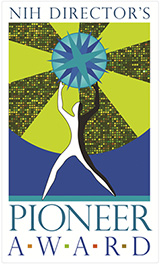2008 Awardees
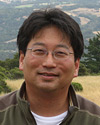
James K. Chen, Ph.D.
Stanford University
Project Title: Chemical Embryology: Technologies for Manipulating and Visualizing Development
Grant ID: DP1-OD003792
James K. Chen, Ph.D., is an assistant professor of chemical and systems biology at Stanford University. He is also the director of the Stanford High-Throughput Bioscience Center. Chen received a Ph.D. in chemistry and chemical biology from Harvard University in 1999. His research integrates organic chemistry and developmental biology to probe the cellular and molecular mechanisms of embryogenesis. For example, Chen’s laboratory recently invented a technology that uses light to turn off specific genes in whole organisms. He is using his Pioneer Award to develop synthetic reagents for manipulating and visualizing embryonic genetic programs, with the goal of understanding how tissue formation and regeneration are regulated at the molecular level. Chen’s honors include a Scholar Award from the Sidney Kimmel Foundation and a Basil O’Connor Award from the March of Dimes Foundation.
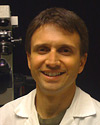
Ricardo Dolmetsch, Ph.D.
Stanford University
Project Title: Using Induced Pluripotent Stem Cells to Identify Cellular Phenotypes of Autism
Grant ID: DP1-OD003889
Ricardo Dolmetsch, Ph.D., is an assistant professor of neurobiology at Stanford University. He received a Ph.D. in neuroscience from Stanford in 1997 and was a postdoctoral fellow at Harvard Medical School. Dolmetsch is a neurobiologist who combines advanced microscopy, biochemistry, and genetics to determine how mutations alter the development and function of neurons in people with autism. He is using the Pioneer Award to develop methods of using adult human stem cells to generate neurons from people with autism and to study the properties of those cells. Dolmetsch’s honors include a Burroughs Wellcome Award, a Searle Scholar Award, a McKnight Scholar Award, and a Society for Neuroscience Young Investigator Award.

James Eberwine, Ph.D.
University of Pennsylvania
Project Title: Cellular Logic of Phenotype
Grant ID: DP1-OD004117
James Eberwine, Ph.D., is the Elmer Holmes Bobst Professor of Pharmacology at the University of Pennsylvania, where he also co-directs the Penn Genome Frontiers Institute. Eberwine received a Ph.D. in biochemistry from Columbia University in 1985. He is a molecular neurobiologist who has been interested in the molecular biology underlying how single neurons work in the context of other connected and surrounding cells. Eberwine is using his Pioneer Award to understand how RNA populations encode a cellular memory that helps to control the development and maintenance of cellular identity. His work, while fundamental in nature, will help in seeding the field of RNA therapeutics. Eberwine’s honors include an NIH MERIT Award, two Distinguished Investigator Awards from the National Alliance for Research on Schizophrenia and Depression, and the Presidential Lecture for the Society of Neuroscience.

Joshua M. Epstein, Ph.D.
Brookings Institution/Santa Fe Institute
Project Title: Behavioral Epidemiology: Applications of Agent-Based Modeling to Infectious Disease
Grant ID: DP1-OD003874
Joshua M. Epstein, Ph.D., is a senior fellow in economic studies and director of the Center on Social and Economic Dynamics at the Brookings Institution. He is also an external professor at the Santa Fe Institute. He received a Ph.D. in political science from the Massachusetts Institute of Technology in 1981. His primary research is in modeling complex social, economic, and biological systems using agent-based computational methods and nonlinear dynamical systems. He has taught computational and mathematical modeling at Princeton University and the Santa Fe Institute Summer School. His Pioneer Award research is modeling how human behavioral adaptations shape infectious and chronic disease dynamics at multiple scales. Epstein is a recognized leader in the field of agent-based computational modeling. The Large-Scale Agent Model, built under his direction, won the 2008 Award for Outstanding Achievement in Analysis from the National Training and Simulation Association. His book, Generative Social Science: Studies in Agent-Based Computational Modeling, was published in 2006.

Bruce A. Hay, Ph.D.
California Institute of Technology
Project Title: Engineering the Genetics of Wild Mosquito Populations to Fight Infectious Disease
Grant ID: DP1-OD003878
Bruce A. Hay, Ph.D., is an associate professor of biology at the California Institute of Technology. He received a Ph.D. in neuroscience from the University of California, San Francisco, in 1989. Hay is a biologist who uses genetic and developmental tools to understand and manipulate the biology and genetics of wild populations. He is using his Pioneer Award to pursue a strategy for preventing malaria in humans by introducing genes that block transmission of the disease into populations of wild mosquitoes. Hay’s honors include awards from the Burroughs Wellcome Fund and the Ellison Medical Foundation as well as a Searle Scholar Award.

Ann Hochschild, Ph.D.
Harvard Medical School
Project Title: A New Genetic Approach for Studying Prions and Other Pathogenic Protein Aggregate
Grant ID: DP1-OD003806
Ann Hochschild is a professor in the Department of Microbiology and Molecular Genetics at Harvard Medical School. She received a Ph.D. in cellular and developmental biology from Harvard University in 1986. Hochschild's research has focused primarily on the mechanisms of transcription regulation. Her laboratory has probed the underlying molecular events by taking advantage of the relative simplicity of the prokaryotic transcription machinery and E. coli genetics. With her Pioneer Award, Hochschild is developing bacteria-based genetic systems for the study of prions. Her honors include a Junior Fellowship at the Harvard Society of Fellows, a Searle Scholar Award, a Presidential Young Investigator Award, an American Heart Association Established Investigator Award, and election to the American Academy of Microbiology.

Charles M. Lieber, Ph.D.
Harvard University
Project Title: Nanowire Nanoelectronic/Cell Assemblies as Hybrid Functional Biomaterials
Grant ID: DP1-OD003900
Charles M. Lieber, Ph.D., is the Mark Hyman Professor of Chemistry at Harvard University. He received a Ph.D. in chemistry from Stanford University in 1985. Lieber’s interdisciplinary research focuses on the synthesis, fundamental physical properties, and applications of nanoscale materials with a focus on problems in the life sciences, nanoelectronic systems, and renewable energy. He is using the Pioneer Award to develop active interfaces between nanoelectronic devices, cells, and tissue to create new tools for understanding the behavior of neural networks and the development of sophisticated, electrically based cell-tissue interfaces for prosthetics and other medical devices. His honors include the Scientific American Award in Nanotechnology, the American Chemical and American Physical Society Awards in New Materials, the Feynman Prize in Nanotechnology, and a National Science Foundation Creativity Award. Lieber is an elected member of the National Academy of Sciences and the American Academy of Arts and Sciences.
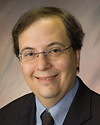
Barry London, M.D., Ph.D.
University of Pittsburgh
Project Title: In-Vivo Electrophysiology Imaging
Grant ID: DP1-OD003819
Barry London, M.D., Ph.D., is the Harry S. Tack Professor of Medicine and chief of the Division of Cardiology at the University of Pittsburgh, and director of the UPMC Cardiovascular Institute. He received an M.D. and a Ph.D. in physiology and biophysics from the Albert Einstein College of Medicine in 1987 and did postgraduate training at Massachusetts General Hospital. London’s work has centered on the identification and characterization of genes involved in sudden cardiac death. He is using the Pioneer Award to develop novel techniques for imaging electrical activity within the heart and interactions between the nervous system and the heart. London is a recipient of an Established Investigator Award from the American Heart Association and is a member of the American Society for Clinical Investigation and the Association of University Cardiologists.

Tom Maniatis, Ph.D.
Harvard University
Project Title: Use of Induced Pluripotent Stem Cells to Study Mechanims of Familial and Sporadic
Grant ID: DP1-OD003930
Tom Maniatis, Ph.D., is a professor of molecular and cellular biology at Harvard University. He received a Ph.D. in molecular biology from Vanderbilt University in 1971 and carried out postdoctoral studies at Harvard and in Cambridge, England. Maniatis uses molecular genetic approaches to study basic mechanisms of gene expression. With his Pioneer Award, he is exploring the underlying mechanisms of amyotrophic lateral sclerosis (ALS), a neurodegenerative disease of motor neurons. His approach involves the characterization of cultured motor neurons from patient-derived stem cells. An understanding of ALS disease mechanisms could lead to the development of a therapy for this incurable disease. Maniatis is a member of the National Academy of Sciences and his honors include the Richard Lounsbery Award in Biology and Medicine, the Pasarow Award in Cancer Research, the Novartis Drew Award in Biomedical Research, and the Scientific Achievement Award from the American Medical Association.

Teri W. Odom, Ph.D.
Northwestern University
Project Title: Reconstructing Sub-Cellular Structure Using Plasmonic Metamaterials
Grant ID: DP1-OD003899
Teri W. Odom, Ph.D., is an associate professor of chemistry and materials science and engineering at Northwestern University. She received a Ph.D. in chemical physics from Harvard University in 2001. Odom is a materials chemist who combines top-down fabrication and bottom-up synthesis to control architecture at the 100-nm level. She has developed large area, multiscale nanopatterning tools to create noble metal (plasmonic) structures that can manipulate light at the nanoscale. Odom is using her Pioneer Award to develop new types of plasmonic materials that can resolve subcellular structure in three dimensions and without labels. Odom’s honors include a David and Lucile Packard Fellowship, a National Science Foundation CAREER Award, a Sloan Research Fellowship, a Research Corporation Cottrell Scholar Award, an American Chemical Society ExxonMobil Solid State Chemistry Fellowship, a DuPont Young Professor Award, and a Rohm and Haas New Faculty Award.
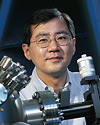
Hongkun Park, Ph.D.
Harvard University
Project Title: Nano- and Microelectronic Tools for Interrogating Neuronal Circuits and Networks
Grant ID: DP1-OD003893
Hongkun Park, Ph.D., is a professor of chemistry and of physics at Harvard University. He received a Ph.D. in physical chemistry from Stanford University in 1996. Park has been performing groundbreaking research in the areas of nanoscience and technology, most notably in studying single-molecule transistors and one-dimensional nanostructures with novel electronic, optoelectronic, and plasmonic properties. He is using his Pioneer Award to develop new nano- and microelectronic tools that can perturb and record real-time dynamics of in vitro and in vivo neuronal ensembles in a cell-specific fashion. These tools will enable the systematic translation of synaptic connectivity to network function, helping scientists to unravel the design principles of the brain. The tools will also allow network-based diagnostics of neurodegenerative diseases. Park’s honors include a David and Lucile Packard Fellowship, a Sloan Research Fellowship, a National Science Foundation CAREER Award, a Camille and Henry Dreyfus Teacher-Scholar Award, the World Technology Network Fellowship, and the Ho-Am Prize in Science.

Aviv Regev, Ph.D.
Massachusetts Institute of Technology/Broad Institute
Project Title: The Temporal Reconfiguration of Regulatory Networks: From Yeast to Cancer
Grant ID: DP1-OD003958
Aviv Regev, Ph.D., is an assistant professor of biology at the Massachusetts Institute of Technology and a core member of the Broad Institute of MIT and Harvard. She received a Ph.D. from Tel Aviv University, Israel, in 2003. Regev is a computational biologist who combines genomics and computational approaches to study how complex molecular networks function and evolve. She is using her Pioneer Award to reconstruct epigenetic and genetic changes in regulatory networks over time to achieve a unified understanding of how networks process information, adapt to their environment, and malfunction in human disease. Regev’s honors include the 2008 Overton Award from the International Society of Computational Biology, a Career Development Award from the Burroughs Wellcome Fund, and a Sloan Research Fellowship.

Aravinthan D.T. Samuel, Ph.D.
Harvard University
Project Title: Biophysical Approaches to Complex Navigational Behaviors in Larval Drosophila melanogaster
Grant ID: DP1-OD004064
Aravinthan D.T. Samuel, Ph.D., is an associate professor of physics and a faculty member in the Center for Brain Science at Harvard University. He received a Ph.D. in biophysics from Harvard University in 1999. Samuel is a biophysicist who has long been interested in the mechanisms that give rise to purposeful behavior in simple organisms. He is using his Pioneer Award to develop the Drosophila larva as a powerful model system to analyze the neural circuits that mediate sensory perception and decisionmaking during the navigational behaviors that this animal exhibits in complex environments. He will develop novel techniques derived from physical optics to noninvasively monitor neural activity deep within the brains of larvae as they move freely during behavioral tasks. His work will provide fundamental insights into how an animal's nervous system regulates and produces behavior. Samuel’s honors include a Presidential Early Career Award for Scientists and Engineers, a Sloan Research Fellowship, a McKnight Scholar Award, and a Brain and Immuno-Imaging Award from the Dana Foundation.

Saeed Tavazoie, Ph.D.
Princeton University
Project Title: Towards a Cognitive Rramework for Understanding Cellular Behavior
Grant ID: DP1-OD003787
Saeed Tavazoie, Ph.D., is an associate professor of molecular biology and a member of the Lewis- Sigler Institute for Integrative Genomics at Princeton University. He received a Ph.D. in biophysics from Harvard University in 1999. Tavazoie uses genomic and computational methods to study the structure, function, and evolution of regulatory networks across organisms ranging from bacteria to humans. He is using his Pioneer Award to study how regulatory networks are shaped by the complex and dynamic environments of native microbial habitats. In particular, his research will explore how such “internal representations” allow single-cell organisms to carry out cognitive tasks typically associated with metazoan nervous systems. Tavazoie’s honors include a CAREER Award from the National Science Foundation.

Alice Y. Ting, Ph.D.
Massachusetts Institute of Technology
Project Title: Enabling the Study of Endogenous Proteins in Live Cells
Grant ID: DP1-OD003961
Alice Y. Ting, Ph.D., is an associate professor of chemistry at the Massachusetts Institute of Technology. She received a Ph.D. in chemistry from the University of California, Berkeley, in 2000. Ting is an organic chemist and biochemist who is developing new reporters and technologies for live cell imaging. She is using her Pioneer Award to develop new approaches to the study of endogenous proteins in living cells. The goal is to circumvent the problems associated with recombinant protein and transgene expression in cells and tissue to enable the study of endogenous proteins in their native form and native context. Ting’s honors include a McKnight Technology Award, a Technology Review TR35 Award, a Sloan Research Fellowship, an Office of Naval Research Young Investigator Award, an NIH Career Development Award, and a Camille and Henry Dreyfus Teacher-Scholar Award.

Alexander van Oudenaarden, Ph.D.
Massachusetts Institute of Technology
Project Title: Stochastic Gene Expression in Differentiation and Development
Grant ID: DP1-OD003936
Alexander van Oudenaarden, Ph.D., is a professor of physics at the Massachusetts Institute of Technology. He received a Ph.D. in experimental condensed matter physics in 1998 from Delft University of Technology in the Netherlands. Van Oudenaarden is a biophysicist whose goal is to quantitatively understand the origins and consequences of stochastic gene expression using a combination of experimental and computational methods. He is using the Pioneer Award to explore how stochastic gene expression is controlled during embryonic development and cellular differentiation. Van Oudenaarden’s honors include a National Science Foundation CAREER Award, a Sloan Research Fellowship, and a Guggenheim Fellowship.


